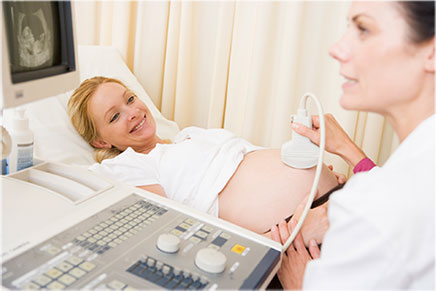Prenatal Care
Care During Pregnancy
First Trimester Screening
As soon as you know you’re pregnant, it’s time to enter into prenatal care. Pregnancy is an incredible experience but it’s also a time to take extra care of yourself and spend a little extra time with us.
-
What is a First Trimester Screening?
-
How is a Nuchal Scan Performed?
-
When Is a Nuchal Scan Performed?
-
How Accurate are Nuchal Scans?
-
What Should I Do If My Nuchal Scan Comes Back Positive?
-
What Risks are Associated with Nuchal Scans?
Ultrasound Examination
 Prenatal ultrasounds are common part of a new mother’s prenatal testing. Using high-frequency sound waves, ultrasounds produce images of a fetus and the mother’s reproductive organs. These sessions, which are usually performed in a doctor’s office, track fetal growth and development and monitor for any ongoing problems.
Prenatal ultrasounds are common part of a new mother’s prenatal testing. Using high-frequency sound waves, ultrasounds produce images of a fetus and the mother’s reproductive organs. These sessions, which are usually performed in a doctor’s office, track fetal growth and development and monitor for any ongoing problems.
Standard ultrasounds are two-dimensional. A water-based gel is applied directly to the mother’s abdomen, and a wand, also called a transducer, will be maneuvered around the area. Transvaginal ultrasounds may also be used, in which a smaller transducer is placed inside the vaginal canal.
The images being captured will then be shown on a screen in black-and-white. These are used from the very beginning of pregnancy to confirm the gestational age and size of the fetus, monitor the fetal heartbeat, examine the mother’s reproductive system, and diagnose any abnormalities. Doctors may also use ultrasounds to guide them as they perform other tests, such as an amniocentesis (an analysis of the amniotic fluid).
Ultrasounds are usually performed as part of screening or medically recommended testing, and should not be performed solely to reveal the sex of the fetus. Doctors also do not recommend ‘souvenir’ ultrasounds, as these might pose as-yet unknown risks for the fetus.
Childbirth Setting & Environment
While most people immediately think of giving birth in a hospital, you may be surprised to hear that you do have other options, including home births and birth centers. Read on to find out which birthing option is best for you!
Hospital
Pros: Hospitals have plenty of emergency personnel on hand, so if anything goes wrong, you are in good hands. If you or your baby have any complications, a fully stocked and staffed OR and NICU are generally just an elevator ride away. Hospitals are the only option for patients who require a C-section, and are recommended for patients who have a high-risk pregnancy. Hospitals also offer round-the-clock help.
Cons: Hospitals often have many strict guidelines, policies, rules and red tape that can interfere with a mother’s birth plan. Mother and baby are also often separated following the birth.
Home Birth
Pros: The mother is allowed to give birth in a familiar, relaxing environment. She has much more control over the birth process, and can move around, eat, drink, shower and dress as she pleases. Children are welcome to attend. The cost of home birth is typically lower than the cost of a hospital birth. A trained midwife is generally still present to make sure everything goes well.
Cons: Home birth may not be an option for women who are having twins or who have health conditions or complications, including diabetes, hypertension or preeclampsia. It is not an option for women who need a C-section. If something goes wrong, the mother and baby will still need to be transferred to the hospital. There are also no at-home options for pain relief.
Birth Center
Pros: A middle ground between a hospital and a home birth, birth centers take a natural, family centered approach to birth, while still offering low-tech medical interventions. Mothers have more freedom to give birth as they want than in a hospital setting. Pain relief options are often available. Certified nurse-midwives will typically care for the mother during birth. Childbirth is viewed as a normal, safe, and healthy process, but precautions are taken just in case. Many birth centers are now located inside hospitals, meaning that transfer to the hospital proper in case of an emergency would be faster.
Cons: Dedicated birth centers have rigid requirements and usually only accept low-risk pregnancies. Mothers must still be transported to the hospital in case of a serious emergency, and while birth centers are more comfortable and relaxed than a hospital, they still aren’t home.
Hospitals, home births and dedicated birth centers are all excellent choices for different women. Speak to your doctor about your risk level and birthing requirements to see which option is best for you.


